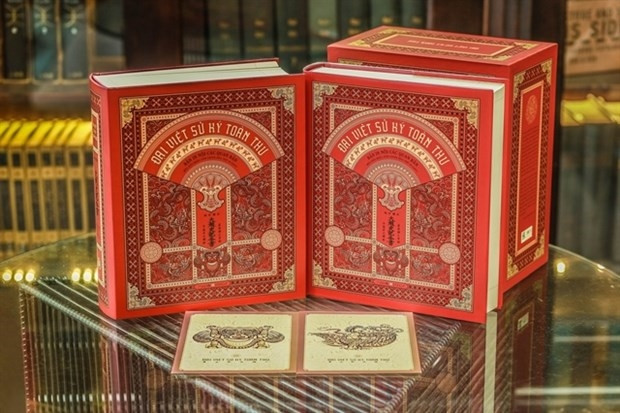A new version of Dai Viet Su Ky Toan Thu (The Complete Annals of Dai Viet), a national historical series of books in Han or ancient Chinese characters, has been released by the Van Hoc (Literature) Publishing House.

The new version of Dai Viet Su Ky Toan Thu (The Complete Annals of Dai Viet) released by the Van Hoc (Literature) Publishing House (Photo courtesy of the publisher)
It includes two books of the history of Vietnam from King Duong Vuong's reign (2879 BC) to Le Gia Tong's reign of the later Le Dynasty (1675).
The first book was translated into Vietnamese by cultural researchers Ngo Duc Tho and Hoang Van Lau. It was edited by professor and author Ha Van Tan.
The second book is a copy in Han from the original wood block series in 1697.
"Dai Viet Su Ky Toan Thu is the oldest official historical text which remains comprehensive up to now. It also is an invaluable treasure of Vietnamese culture, a rich source of information to research into history and other social science branches," said Vo Thuy Trang, a final-year student in literature faculty of the Ho Chi Minh City University of Education.
Dai Viet Su Ky Toan Thu was written, carved and printed by different generations of historians under the Le and Tran dynasties, such as Le Van Huu, Phan Phu Tien, Ngo Si Lien, Pham CongTru and Le Hy.
It was first translated into Vietnamese by sinologist Cao Huy Du, and released in 1967.
The series’ highlights include the pages featuring King Tran Nhan Tong, the 4th King of the Tran Dynasty, which lasted for 175 years from 1225 to 1400 with 14 kings.
King Tran Nhan Tong was born and grew up in the capital of Thang Long, now Ha Noi.
In 1284, being informed of the advance of 500,000 enemy troops from the north, King Tran Nhan Tong summoned a nationwide meeting of elders at Dien Hong Palace to seek advice on a national defence policy as the situation worsened.
After the great victory over the Chinese Yuan invasion forces, the King ceded the throne in favour of his son Tran Anh Tong, and retreated to the mountain of Yen Tu to practise Buddhism and attain enlightenment, hence the title Royal Buddha.
His contributions to Vietnamese history and culture confirmed his position as a virtuous king and great Buddhist.
VNA